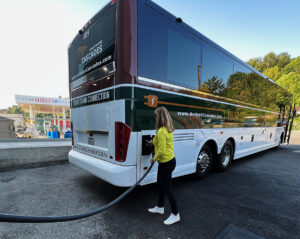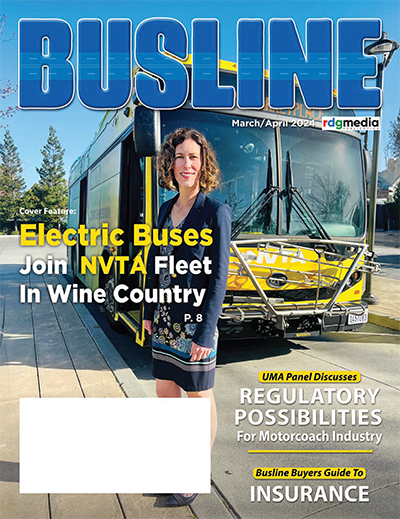Navigating The Road Ahead: Embracing Green Transformation In Motor Coach Transportation
By Jeremy Butzlaff, President of MTRWESTERN

MTRWESTERN officials have embraced a future that includes electric motor coaches. (Photo courtesy of MTRWESTERN)
As the President of MTRWESTERN, a leading Pacific Northwest based motor coach company committed to innovation and sustainability, I am keenly aware of the pivotal role our industry plays in shaping the future of transportation. With the growing urgency to reduce carbon emissions and combat climate change, the adoption of alternative fuels and electric buses presents both a challenge and an opportunity for companies like ours.
Navigating Decisions
As a bus operator, the decision to transition your fleet for a greener future is not one to be taken lightly. It requires careful consideration of various factors, including technological advancements, charging infrastructure availability, regulatory requirements, and of course, financial implications. At MTRWESTERN, we recognize that embracing sustainability is not just a moral imperative but also a strategic business decision that can enhance our competitiveness and resilience in the long term. Simply put, it’s good business.
Tackling Challenges
Undoubtedly, transitioning a fleet that is equipped for the future poses its fair share of challenges. One of the primary concerns is the initial investment required for vehicle procurement and infrastructure development. While the long-term cost savings and environmental benefits are compelling, many companies may rightfully hesitate due to the upfront costs involved. Additionally, the range and charging infrastructure for electric buses are still evolving, presenting logistical challenges, especially for long-distance routes.
There also may be resistance from company stakeholders accustomed to traditional diesel vehicles. Addressing concerns about range, performance, and reliability is crucial to gaining buy-in from ownership, drivers, maintenance staff, and passengers. Furthermore, navigating the complex regulatory landscape and securing incentives or grants to support the transition can be daunting for companies, especially smaller operators with limited resources.
Embracing Opportunities
Amidst these challenges, there are significant opportunities to be seized. Embracing alternative fuels and electric buses allows motor coach companies to demonstrate their commitment to sustainability and environmental stewardship, enhancing their brand reputation and appeal to eco-conscious consumers. Moreover, adopting cleaner technologies can lead to operational cost savings over the long term, thanks to lower fuel and maintenance expenses.
The shift toward alternative fuels also presents opportunities for collaboration and innovation within the industry. By partnering with manufacturers, technology providers, energy companies, and government agencies, motor coach companies can leverage expertise and resources to overcome barriers and accelerate the adoption of sustainable transportation solutions.
The Biggest Lesson Learned
At MTRWESTERN, we view the transition to alternative fuels such as R99 renewable diesel and electric buses as an opportunity to lead by example and drive positive change in the industry. We have proudly taken significant steps toward this goal, including launching the nation’s first intercity electric bus route in partnership with Amtrak and the Washington Department of Transportation, investing in charging infrastructure for our facilities, shifting 56 percent of our monthly miles driven to operations on R99 as a fuel source, and engaging with stakeholders to advocate for supportive sustainable transportation policies.
Nonetheless, perhaps the most important lesson we’ve learned on our journey to electrification is the importance of staying flexible and adaptive in the face of uncertainty and complexity. You cannot be afraid to fail…fast. Failing fast is a necessity to identify system failures early and make strategic corrections.
From evolving regulatory requirements to advancements in technology, the landscape of electrification is constantly evolving. By remaining agile and responsive, we’ve been able to quickly adapt to changing conditions, seize new opportunities, and overcome obstacles along the way. Whether it’s adjusting our strategy in response to market trends, finding new partnerships, fine-tuning our operations based on feedback from drivers and passengers, or sharing our challenges and successes on this path to electrification, flexibility is key to success in the transition to electric buses.
Moving forward, we are committed to continuing our efforts to reduce our carbon footprint and minimize our environmental impact. This includes expanding our use of R99, increasing our fleet adoption of electric buses via awarded grants, investing in renewable energy infrastructure, and exploring innovative solutions to increase electric charging infrastructure. By embracing sustainability as a core value and integrating it into every aspect of our operations, we believe we can not only thrive in a rapidly evolving market but also contribute to a cleaner, greener future for generations to come.
In conclusion, the decisions, challenges, and opportunities of green fleet transformation are complex and multifaceted. However, by making strategic investments, fostering collaboration, and embracing innovation, we can all play a pivotal role in driving the transition toward a more sustainable transportation ecosystem. Together, we can chart a course toward a brighter, cleaner future.
MTRWESTERN is a leading privately-owned Pacific Northwest based motor coach provider specializing in Charter, Shuttle and Fixed Route transportation services. Transportation is our product, but hospitality is our business. We maintain and dispatch a fleet of modern vehicles from our four hub locations in Seattle, Spokane, Portland, and Eugene. Learn more at mtrwestern.com.

